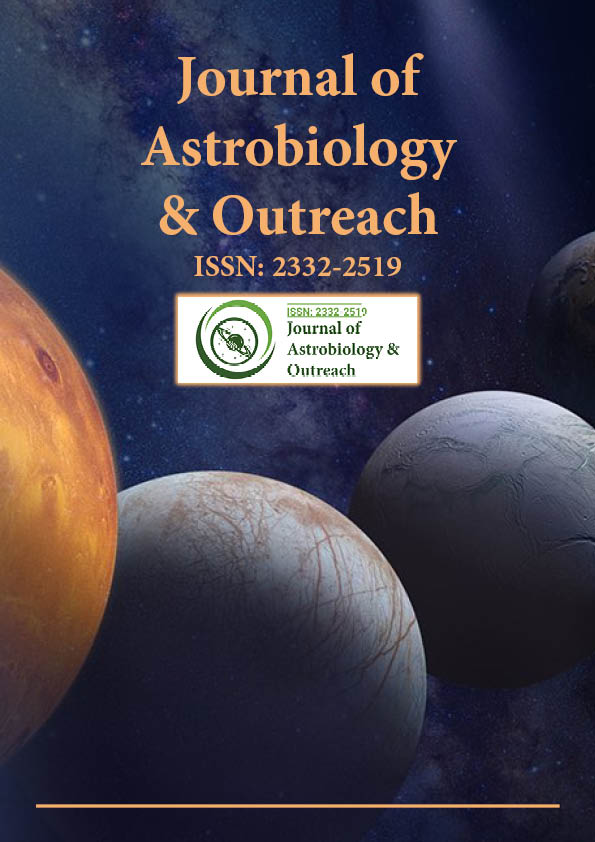Indexed In
- Open J Gate
- Academic Keys
- JournalTOCs
- RefSeek
- Hamdard University
- EBSCO A-Z
- OCLC- WorldCat
- Google Scholar
Useful Links
Share This Page
Journal Flyer

Open Access Journals
- Agri and Aquaculture
- Biochemistry
- Bioinformatics & Systems Biology
- Business & Management
- Chemistry
- Clinical Sciences
- Engineering
- Food & Nutrition
- General Science
- Genetics & Molecular Biology
- Immunology & Microbiology
- Medical Sciences
- Neuroscience & Psychology
- Nursing & Health Care
- Pharmaceutical Sciences
Commentary - (2023) Volume 11, Issue 6
The Complex Processes of Cosmochemistry in Cosmology
Jani Thoni*Received: 14-Nov-2023, Manuscript No. JAO-23-24752; Editor assigned: 17-Nov-2023, Pre QC No. JAO-23-24752 (PQ); Reviewed: 01-Dec-2023, QC No. JAO-23-24752; Revised: 08-Dec-2023, Manuscript No. JAO-23-24752 (R); Published: 15-Dec-2023, DOI: 10.35248/2332-2519.23.11.322
Description
The study of the chemistry of the cosmos, including its formation and evolution, is known as cosmology. It is a subfield of astrochemistry and astronomy with strong ties to cosmology. Astrobiology, the study of the beginnings, evolution, distribution, and prospects of life in the cosmos, is intimately associated with cosmochemistry. Considerate the universe's beginnings, composition, and evolution across time are the focus of cosmology. Cosmochemists specifically research the components that comprise the universe and their historical distribution and modification. In addition, cosmologists research the chemical processes that take place in the universe, including star formation, planetary formation, and nuclear reactions. Considerate the cosmos and its evolution are important for calculating the universe's future, and this is why cosmochemistry research is so vital. Their discoveries are used by cosmochemists to monitor investigations in astrobiology, astronomy, and other relevant domains. Considerate cosmochemistry is also important to know the formation of planets and the possible origins of life in the universe. Cosmochemistry is an interesting and dynamic subject of research. It is an important component of growing our knowledge of the universe and its elements, and its discoveries can help in our exploration and considerate of the cosmos.
Numerous chemical elements make up the universe, and each one plays a part in the development and evolution of galaxies, stars, and planets. The scientific field of cosmology examines the chemical elements and their distribution over the cosmos. They will discuss the fundamentals of cosmochemistry and how it helps in the identification of the universe's basic chemical elements in this article. Hydrogen is the most important component to take into account while discussing cosmochemistry. The most prevalent element in the universe, hydrogen accounts for around 75% of its mass. There are a few more atoms that are also present in the cosmos in significant amounts in addition to hydrogen. These consist of nitrogen, carbon, oxygen, and helium. These atoms are not equally available throughout the universe; actually, some regions of space, such as galaxies' centers, are significantly richer in hydrogen and helium, while other areas are composed of more complicated elements like oxygen, carbon, and nitrogen. Cosmochemists examine the quantity of various elements in various places to gain a considering of the chemical makeup of the universe. The universe's elemental available can also provide some insight into the situations surrounding their formation. For instance, only highly specialized conditions, such extremely hot and dense surroundings, can cause the formation of some elements.
Cosmochemists can learn more about the genesis and development of galaxies, stars, and planets by examining the abundance of elements across the cosmos. Considerate the evolution of our cosmos requires a considerate of cosmochemistry. They can learn more about the origins and development of the cosmos by examining the chemical elements and their abundance in various parts of space. It is important for them to know the processes that lead to the creation of the universe's chemical constituents as they explore it. Cosmochemistry is a branch of science that considers the origins of the different elements that make up the universe. Elements develop through a complex process involving many different interactions. The most frequent process is nucleosynthesis, which is the inclusion of two atoms to create heavier elements and takes place in stars. These components disperse throughout time and may eventually end up in the interstellar medium, which is made up of star-forming areas, interstellar clouds, and other celestial objects. Elements are formed by a variety of methods besides nuclear fusion.
Since supernovae produce strong shock waves that can lead to atoms fusing together to form new elements, they are also imagined to have a role in the production of elements. Lastly, elements can also originate as a result of chemical interactions that occur within and between stars. For example, massive amounts of energy released by stellar collisions have the ability to fuse atoms to generate heavier elements. Cosmochemistry includes a considerate of the processes that lead to the development of the chemical elements. Scientists can learn more about the beginnings of the different elements in the universeand how they have changed during time by observing these processes.
Citation: Thoni J (2023) The Complex Processes of Cosmochemistry in C osmology. J Astrobiol Outreach. 11:322.
Copyright: © 2023 Thoni J. This is an open-access article distributed under the terms of the Creative Commons Attribution License, which permits unrestricted use, distribution, and reproduction in any medium, provided the original author and source are credited.

